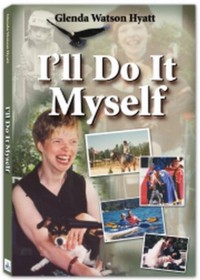Life with Cerebral Palsy: A Master in Applied Disability Studies
Saturday I received an interview request from Fernanda for an assignment for her Masters degree in Applied Disability Studies at Brock University. I concurred. I asked if I could share the interview with my blog readers. She concurred.
1. How was your parents’ reaction when they found out that their baby had Cerebral Palsy?
Initially, they were understandably shocked with the complications of my birth and the following few days. Then they were fairly matter-of-fact; this is the situation, what do we do to make the most of it? The official diagnosis came later. By then, they knew I had some kind of disability. Mom might have even known it was cp. The diagnosis gave them confirmation and a label that Mom then began researching at the medical library at the University of British Columbia where she was a student – she was in Education, getting her specialty in Special Education.
2. How was the support from the rest of your family?
My family has always been very supportive. I’m not sure my Grandma (my Dad’s mom) fully understood, but she did accept me in her own way.
3. Did your parents have any kind of difficulty to register you in a regular school?
I began my schooling in a special education class and was gradually integrated into a regular class. Beginning in Grade Eight, I attended our local high school. Near the end of Grade Seven, I went through some testing with the school psychologist, which I didn’t think was fair since my fellow classmates didn’t have to go through the same testing. The results were to convince the high school staff that I was capable of handling the regular curriculum. Once I began Grade Eight and had proven what I was capable of, their concerns dissipated. Being on the Honour Roll my first semester clinched it.
4. Did you have any problem to be accepted in your school and/or in your community?
For the most part, I didn’t have a problem with other kids teasing me in high school. When I started in Brownies back in elementary school, the girls fought over who would push my small red wheelchair. They saw it as a special privilege. A few friendships from high school and Brownies/Girl Guides still exist today. Those ones are dear to me.
5. Did you ever asked why me?
No, no really; at least not for any length of time. I see my cerebral palsy as something that is. No amount of crying and self-pity is going to change that fact. I might as well as get on with it and make the most of what I do have. There is so much I can do; I try to focus on that.
6. In your daily life, you face challenges all the time, simple things that we take for granted like open the door, turn the lights off and other rather mundane tasks constitute a challenge for you. Where do you find strength to fight and don’t get bitter?
Yes, simple things can be frustrating, even extremely frustrating at times. I keep trying until I get it or find a way around it. Otherwise, I would be sitting in the dark!
In the really tough moments, I think about my Nanna (my Mom’s mom). She had bone cancer. She crawled up and down the old wood stairs to do the laundry in the basement. I figure if she could do that, then I deal with my minute frustration or pain in the moment.
7. Can you tell me if you had any kind of situation in your life that made you feel really angry and/or upset with society?
Searching for a job was tough. All of my life, I had been told to try my best and to work hard, and that I could do anything I wanted. My disability didn’t matter. But when I went for interviews, it felt like the employers couldn’t see beyond my disability to see my abilities, skills and talents. They didn’t give me the opportunity to try and to prove what I could do. That really hurt and was very discouraging.
8. What do you think that politicians and big companies should do to help people with disability feel included in our society?
There is so much they could do to include people with disabilities in society. Briefly, two main areas are:
- accessibility, in every possible way – from infrastructure (buildings, transportation and community planning) to health care, to web accessibility, to access to services, to product development, to the electoral process and the list goes on; and
- meaningful job creation and employment, with adequate supports and opportunities for further training and career advancement.
9. When did you have the idea to write your autobiography?
When I was ten, I read books like Joni, Other Side of the Mountain and Ice Castles, which about people with disabilities; actually, young women with disabilities. At that time, they were my only role models with disabilities. I decided that one day I would share my life to help others in a similar way. Thirty years later I self-published I’ll Do It Myself.
10. What makes you feel free?
Driving in my scooter with the sun and a big smile on my face – and plenty of accessible sidewalk!

 Subscribe via RSS
Subscribe via RSS



